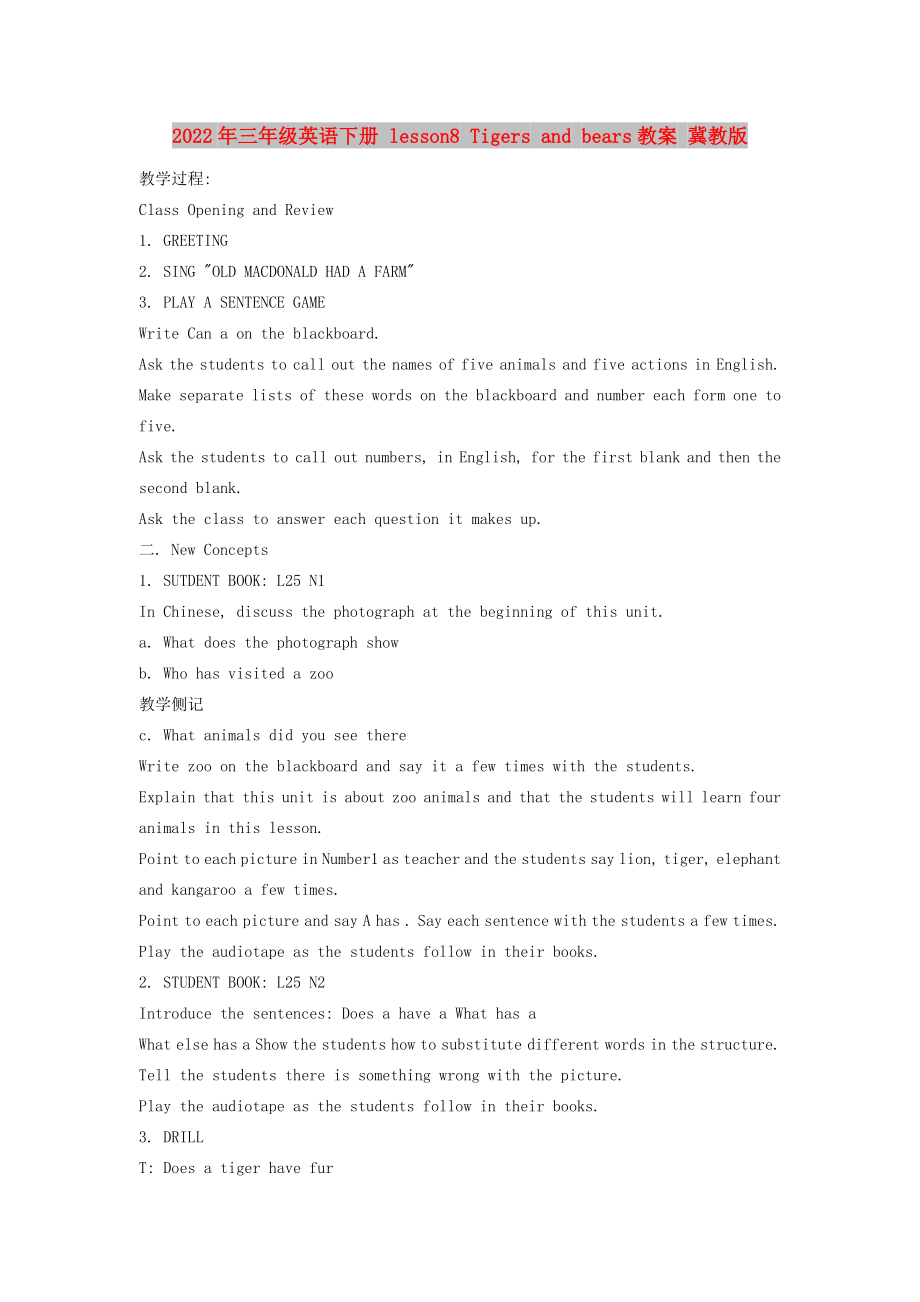《2022年三年級(jí)英語(yǔ)下冊(cè) lesson8 Tigers and bears教案 冀教版》由會(huì)員分享�,可在線閱讀,更多相關(guān)《2022年三年級(jí)英語(yǔ)下冊(cè) lesson8 Tigers and bears教案 冀教版(5頁(yè)珍藏版)》請(qǐng)?jiān)谘b配圖網(wǎng)上搜索�。
1�、2022年三年級(jí)英語(yǔ)下冊(cè) lesson8 Tigers and bears教案 冀教版
教學(xué)過(guò)程:
Class Opening and Review
1. GREETING
2. SING "OLD MACDONALD HAD A FARM"
3. PLAY A SENTENCE GAME
Write Can a on the blackboard.
Ask the students to call out the names of five animals and five actions in English. Make separate lists of these wor
2�、ds on the blackboard and number each form one to five.
Ask the students to call out numbers, in English, for the first blank and then the second blank.
Ask the class to answer each question it makes up.
二. New Concepts
1. SUTDENT BOOK: L25 N1
In Chinese, discuss the photograph at the beginning
3、of this unit.
a. What does the photograph show
b. Who has visited a zoo
教學(xué)側(cè)記
c. What animals did you see there
Write zoo on the blackboard and say it a few times with the students.
Explain that this unit is about zoo animals and that the students will learn four animals in this lesson.
Po
4�、int to each picture in Number1 as teacher and the students say lion, tiger, elephant and kangaroo a few times.
Point to each picture and say A has . Say each sentence with the students a few times.
Play the audiotape as the students follow in their books.
2. STUDENT BOOK: L25 N2
Introduce the se
5、ntences: Does a have a What has a
What else has a Show the students how to substitute different words in the structure.
Tell the students there is something wrong with the picture.
Play the audiotape as the students follow in their books.
3. DRILL
T: Does a tiger have fur
C: Yes, it does.
T
6�、: Does a tiger have a trunk
C: No, it does not.
T: What has a truck
C: An elephant has a trunk.
三.Class Closing.
教學(xué)反思:
附送:
2022年三年級(jí)英語(yǔ)下冊(cè) lesson9 how many教案 冀教版
教學(xué)目標(biāo):
1.技能與知識(shí)目標(biāo):
要求能聽(tīng)懂one, two, three, four, five五個(gè)數(shù)字,并能根據(jù)圖片實(shí)物或漢語(yǔ)意思說(shuō)出五個(gè)數(shù)詞的英文�,不要求認(rèn)讀。
some�,many兩個(gè)詞只要求在對(duì)話或表演中能聽(tīng)懂和會(huì)說(shuō),不要求單個(gè)地說(shuō)�。
要求能
7、聽(tīng)懂和會(huì)說(shuō)“How many…can you see? I can see…”�,丙能用替換詞進(jìn)行會(huì)話。
2.運(yùn)用能力目標(biāo):
能用What’s …?和How many…�?詢問(wèn)物體及物體數(shù)目。
能在他人用What’s …?和How many…�?詢問(wèn)物體及物體數(shù)目,用Some…和I can see…回答�。
3.素質(zhì)教育(文化、情感態(tài)度�、策略)目標(biāo):
了解事物方位變化的相對(duì)性。
對(duì)認(rèn)識(shí)物體的數(shù)目形成初步興趣�。
逐步形成樂(lè)于幫助他人尋找物品的良好品質(zhì),對(duì)用英語(yǔ)參加識(shí)別方位活動(dòng)逐步形成興趣。
初步感知名詞的復(fù)數(shù)變化�,逐步形成良好的學(xué)習(xí)策略。
教學(xué)難點(diǎn):
some�,many,及名詞復(fù)數(shù)的
8�、發(fā)音
學(xué)情分析:
學(xué)生通過(guò)學(xué)前及一年級(jí)的英語(yǔ)學(xué)習(xí)已經(jīng)掌握了很多的可數(shù)名詞,他們熱愛(ài)英語(yǔ)學(xué)習(xí)�,有了一定的良好的學(xué)習(xí)英語(yǔ)的習(xí)慣,能夠在課堂上與教師密切配合�,積極主動(dòng)參與到課堂活動(dòng)中來(lái)�,再加上直呼式英語(yǔ)教學(xué)使得some,many等單詞的讀音簡(jiǎn)單化�,大大降低了本課的難度。
教具準(zhǔn)備:
1.教材相配套的教學(xué)課件�、VCD或錄像等
教學(xué)過(guò)程:
一、熱身/復(fù)習(xí)(Warm-up/Revision)
組織教學(xué):師生打招呼:Hello! Good morning. How are you? Nice to see you.
復(fù)習(xí)上節(jié)課所學(xué)句型:出示課件中的桌子和帽子�,師分別指著桌子和帽子,問(wèn):Wha
9�、t's this? 生:It's a desk/hat.師:Yes, it's a desk/hat.師拖動(dòng)帽子到桌子的上面、里面�、下面,分別問(wèn)學(xué)生:Where is my hat?讓生用“It's on/in/under the desk.”回答�。通過(guò)問(wèn)答練習(xí)上節(jié)課所學(xué)句型:“Where is the …?”和“It's ...”為本節(jié)課的新授知識(shí)做好鋪墊。出示on/in/under三個(gè)方位介詞的圖片�,師生借助手勢(shì)玩聽(tīng)聽(tīng)做做游戲,對(duì)這三個(gè)詞進(jìn)一步鞏固�,同時(shí)提高學(xué)生的學(xué)習(xí)積極性�。
二�、新授知識(shí)
(1)引出課題:
教師隨手拿出一支鋼筆,問(wèn)學(xué)生What's this? 生:It's a p
10�、en.師:Yes, it's a pen。師又問(wèn):How many pens? 師自問(wèn)自答“”師增加手中的鋼筆�,不斷自問(wèn)自答:“pens? Two/Three.”師邊回答數(shù)字,邊用手勢(shì)表示相應(yīng)數(shù)字�,使學(xué)生明白how many 的意思是“多少”,隨后及時(shí)出示課題(拖出隱藏的題目)�,在題目下標(biāo)注how many的輔音讀音,領(lǐng)讀若干遍后齊讀課題�。
(2)學(xué)習(xí)單詞one、two�、three、four�、five
教師畫(huà)簡(jiǎn)筆畫(huà)cat,問(wèn)“What am I drawing?”進(jìn)一步引出one cat�,用手勢(shì)告訴學(xué)生one就是1的意思,拖出隱藏的詞組one cat�,領(lǐng)讀,齊讀數(shù)遍�。
教師畫(huà)簡(jiǎn)筆畫(huà)pig
11、�,問(wèn)“What am I drawing?”進(jìn)一步引出two pigs,用手勢(shì)告訴學(xué)生two就是2的意思,拖出隱藏的詞組two pig�,這里教師要點(diǎn)出“在英語(yǔ)中超過(guò)事物的數(shù)目超過(guò)1個(gè)就要用復(fù)數(shù),大多事物的復(fù)數(shù)實(shí)在但此后加s,所以two pig必須在pig后加s表示超過(guò)了1頭�。”�,師邊說(shuō)邊在pig后加s,領(lǐng)讀�,齊讀數(shù)遍。
用同樣的方法學(xué)習(xí)three foxes, four cows, five birds�,但是要強(qiáng)調(diào)一下foxes、birds的復(fù)數(shù)名次的讀音�。
鞏固練習(xí)1~5的數(shù)字:競(jìng)賽1 mingo游戲,做隊(duì)的小組可得紅花一枚�。
(3)學(xué)習(xí)主題句“How many cats can y
12�、ou see ? I can see one.”
利用白板上畫(huà)的動(dòng)物,師問(wèn)“How many cats can you see ?”并引出答案“I can see one.”師出示主題句�,并掀開(kāi)覆蓋出示see的圖解,領(lǐng)讀�,引導(dǎo)學(xué)生用圖中的事物進(jìn)行替換問(wèn)和答。
鞏固主題句:競(jìng)賽2
聚光燈打到圖片中的哪種動(dòng)物�,同桌倆就套用主題句進(jìn)行問(wèn)答練習(xí),顯示一輪必答�,之后是各組搶答。
(4)學(xué)習(xí)會(huì)話:
出示會(huì)話圖片�,生聽(tīng)錄音,聽(tīng)聽(tīng)Billy和Peg在說(shuō)些什么?多聽(tīng)兩遍讓生說(shuō)出“桌上�、三支鋼筆”,師刪掉覆蓋的圖片�,露出含出“桌上、三支鋼筆”的圖片�,同時(shí)示會(huì)話文字,解釋some一詞的意思�,標(biāo)注在頁(yè)面上,
13�、利用圖片上的事物組詞如some desks, some chairs。點(diǎn)每一句話讓學(xué)生分別跟讀�,最后整體讀。
鞏固對(duì)話:男女生或分成兩個(gè)小組分角色朗讀對(duì)話�。
會(huì)話的延伸與替換:出示三張圖片及會(huì)話關(guān)鍵詞,讓學(xué)生分別進(jìn)行替換練習(xí)�。
三、知識(shí)鞏固:
(1)競(jìng)賽3用白板中的拉幕功能�,蓋住文字,讓生記憶圖片中的事物數(shù)目及位置�,隨后蓋住圖片,找四個(gè)小組的同學(xué)上前把相應(yīng)事物的數(shù)目及位置連起來(lái)�。
(2)競(jìng)賽4
聽(tīng)音畫(huà)圖,并利用白板中的快照功能把學(xué)生兩次畫(huà)的畫(huà)貼在一起給與評(píng)價(jià)�,好的作品保存下來(lái),下課打印出來(lái)放在教室里的《英語(yǔ)天地》里展覽�。
(3)歌曲Five little ducks 鏈接視頻�,聽(tīng)聽(tīng)唱唱�。
四、家庭作業(yè)
聽(tīng)會(huì)話磁帶和交流
 2022年三年級(jí)英語(yǔ)下冊(cè) lesson8 Tigers and bears教案 冀教版
2022年三年級(jí)英語(yǔ)下冊(cè) lesson8 Tigers and bears教案 冀教版

